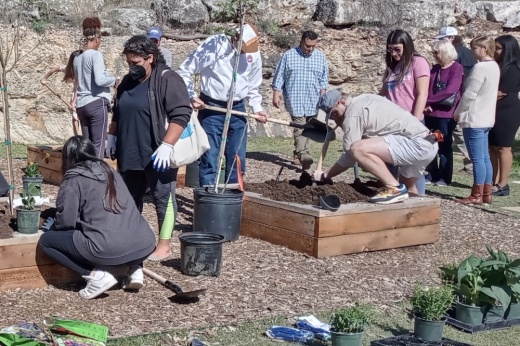One north San Antonio City Council member and a local urban farming nonprofit are hopeful that a newly planted food forest at Encino Branch Library will help the feed the community in due time.
District 9 Council Member John Courage was joined by Gardopia Gardens and a handful of community residents on March 4 at the Encino Park neighborhood library for plantings, which event organizers said will produce fruits, nuts, asparagus and artichokes.
Event attendees lowered trees and accompanying pollinator plants into small raised beds in a plot next to the library building and adjacent children’s playground.
Courage said the public food forest was made possible through his council office’s annual participatory budget program, where District 9 residents are invited each year to propose small community projects for funding with discretionary spending.
Courage also called the food forest a sort of crowning achievement for Encino Library, which in 2022 received the aforementioned playground and public exercise equipment.
“We’ve added amenities to this library since there’s no public park very close to Encino Park even though we’ve included a playground and exercise equipment here,” Courage said.
Courage said he sought to work with Gardopia Gardens, an east-side nonprofit that launched in 2015 to help address local obesity-related diseases and environmental issues by educating residents on healthier eating and sustainability.
“We hope that over the next few years this will become a haven for the community to enjoy nature and the assets that are here for the kids,” Courage said of the new food forest.
Gardopia Gardens founder and CEO Stephen Lucke guided event attendees on the types of trees and pollinator plants that were being planted at the Encino Library food forest.
Lucke said his organization was happy to help bring a new community asset to the Encino Park neighborhood.
“Some people realized they didn’t have the resources to grow annual plants and maintain them here, so we came to a compromise, and we decided to do something with perennials that produce fruit and flowers to help achieve a goal of urban agriculture here,” Lucke said.
Gardopia Gardens’ citywide efforts to educate residents about accessing healthy food and community gardens continue to expand.
“We’re now in 25 schools across five school districts, impacting thousands of kids every week, as well as adults, and help them lead sustainable lives though urban agriculture,” he said.





